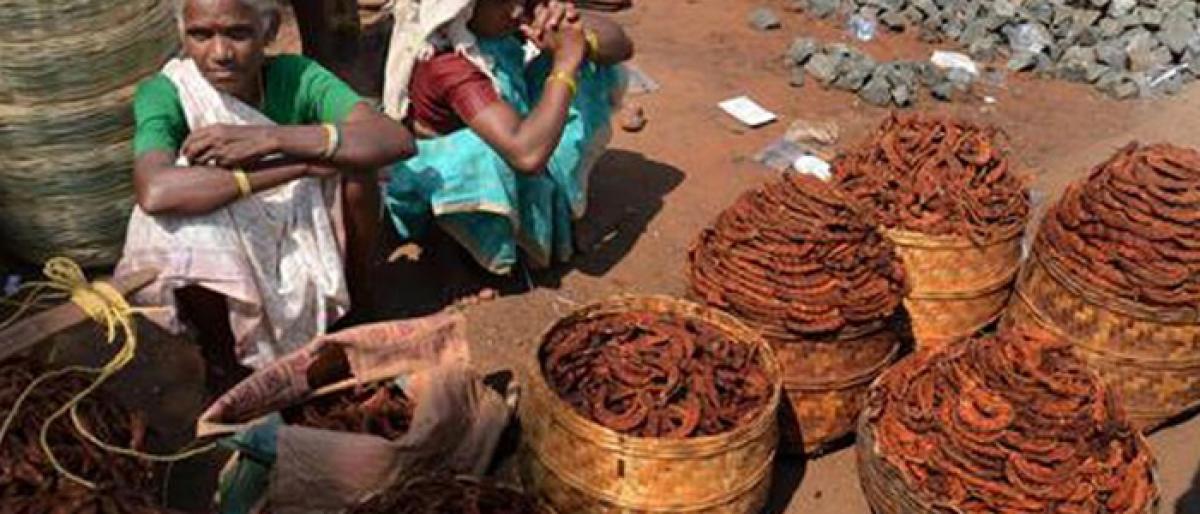Live
- 25% rise in internship opportunities observed in 2024: Survey
- Scholarships For Students
- Student Survives a Near-Fatal Accident at Pallavi Model School
- Prisoner in Sangareddy Central Jail Suffers Heart Attack
- Targeting gut cells may open new way to reduce depression & anxiety
- ‘Daaku Maharaaj’ to kickstart musical promotions
- ‘Game Changer’ team teases with a new promo
- Nara Lokesh emphasises overhaul of govt. schools and mid-day meal program
- Amid turmoil, air pollution peaks in Bangladesh as temperatures fall
- Google Trends unveils list of most searched ‘Indian Movies of 2024’
Just In

Taking advantage of failure by the state government to fix procurement price for tamarind, middlemen are exploiting tribals by offering meagre Rs 15 to Rs 17 a kg in agency areas in the district.
Visakhapatnam: Taking advantage of failure by the state government to fix procurement price for tamarind, middlemen are exploiting tribals by offering meagre Rs 15 to Rs 17 a kg in agency areas in the district.
Tamarind is one of the main source of income to the tribals under ITDA (Integrated Tribal Development Area) in Paderu, Sitampeta and Parvathipuram. At an average 8,000 tonne tamarind is collected from the forest by the tribals which would be procured by Girijan Cooperative Corporation (GCC) at a price fixed by the government in order to protect them from middlemen and traders. During in the last season, the GCC procured tamarind at Rs 22 per kg.
The tribals are demanding the government to announce the price every January to prevent middlemen from exploiting tribals by offering low price. However, the government is announcing the price almost in the third week of March every year. However, the middlemen are reaching to the tribals in February itself and procuring the tamarind at very low price and also assessing the weight of the commodity approximately without using weighing machines.
The tribals are collecting the tamarind and bringing the same in baskets to nearest road point areas. As the commodity is heavy and they have to travel by foot distant places, the tribals are disposing of the commodity at whatever price offered by touts and traders near their hamlets.
GCC officials are saying that due to the delay in fixing the price by the government, the corporation has not yet started procurement of tamarind. In fact, the tamarind trees were badly affected in 2014 Hudhud cyclone. But the situation has improved this year and the crop yield this year is expected to be around 8,000 tonne.
In the plain areas, it is not much difficult to collect tamarind and the farmers too can easily transport their produce to nearest markets and sell at good price. Due to the geographical disadvantages, the tribals are being forced to dispose of their produce to the middlemen for a song.
“It is not correct that we are cheating the tribals by procuring tamarind at cheaper price. In fact, we are reaching to them to collect the commodity which is a big advantage to the tribals.
After deseeding the tamarind, the weight will come down by 50 per cent. The deseeding, processing, transportation and other costs are invisible expenditure. Even GCC or any other agency have to bear these expenses.
We are now offering Rs 15 to Rs 17 a kg according to the quality. The tribals are also correctly assessing the weight of the kavidi (two baskets balanced by a bamboo stick carrying approximately 30 to 40 kg) and there is no need to use weighing measures,” said Kotana Surya Rao, one of the tamarind traders of Anakapalle.
By: Phani Suni

© 2024 Hyderabad Media House Limited/The Hans India. All rights reserved. Powered by hocalwire.com







